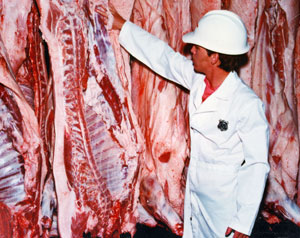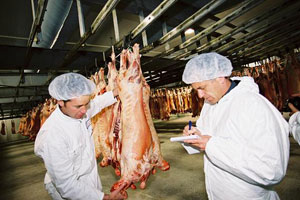Meat Inspector
Tasks & duties

Meat inspectors may do some or all of the following:
-
check the quality and safety of meat and meat products
-
identify diseases and defects in meat and meat products
-
ensure the removal of any meat or meat product not fit for human consumption
-
collect and send samples of blood, fat or tissue to laboratories for testing
-
discuss quality and safety of meat and meat products with clients, other inspectors or meat processing plant workers
-
perform quality control and quality assurance work at meat processing plants
-
keep records and write reports
Skills & knowledge

Meat inspectors need to have:
-
knowledge of animal biology, pathology and anatomy
-
knowledge of meat regulations, food safety laws, occupational safety and health laws, and New Zealand Food Safety Authority requirements
-
knowledge of hygiene standards and practices
-
skills in handling animals and carcasses
-
skills in evaluating the condition of meat
-
the ability to recognise diseases and exotic pests
-
decision making skills
-
oral and written communication skills including report writing skills
-
basic computer skills
-
knife handling skills
Entry requirements
To become a meat inspector you need at least four years of secondary education. You must also pass a medical test including tests for tuberculosis, hepatitis, and colour blindness. You also need a clear police record.
Secondary education
Meat inspectors need to have at least four years of secondary education. Useful subjects include English and biology.
Tertiary education
Once employed, meat inspectors are required to complete a National Certificate Meat Processing. This qualification is part of the Australian Meat Processing Training Package. It covers work activities undertaken by meat inspectors in meat processing enterprises whose duties include performing a post-mortem inspection and in some cases ante-mortem inspection. People seeking registration as a meat inspector should check the current requirements with their state or territory food authority or the Australian Government - Agriculture, as appropriate, when selecting electives.
Training on the job
Skills are gained on the job and through on-the-job training courses.
Useful experience
Useful experience for meat inspectors includes:
-
meat processing work
-
farm work
-
butchery work
-
work with livestock
-
work in the food or meat industry
Related courses
Butchery
Food Hygiene
For more information, please refer to myfuture.
Document Actions
